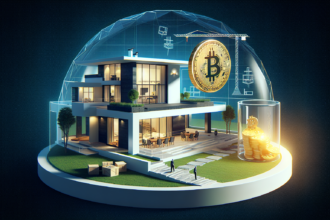From Bitcoin to Bungalows: Real Estate Deals that Made History
The Rise of Bitcoin in Real Estate Transactions
Bitcoin, as a pioneering cryptocurrency, first emerged in 2009 and has since revolutionized various industries, including real estate. The first notable real estate transaction involving Bitcoin occurred in 2014 when an unnamed buyer acquired a house in Austin, Texas, for a staggering 0.5 BTC, valued at around $300 at that moment. This transaction brought global attention to the potential of cryptocurrency in real estate.
The process of using Bitcoin for property purchases eliminates banks and traditional financial institutions from the equation, allowing for faster transactions and reduced fees. Such innovative transactions have attracted tech-savvy investors, eager to embrace the future of purchasing property.
In 2017, also in Austin, a luxury home, known as the “Bitcoin Mansion,” was listed for sale at $1.2 million, and the seller accepted Bitcoin as a payment method. The attractiveness of crypto transactions lies in their transparency and security, which are appealing qualities for both buyers and sellers in today’s increasingly digital real estate landscape.
The Appeal of Tokenization in Real Estate
Tokenization has revolutionized how assets are owned and traded, allowing investors to buy fractional ownership in property through blockchain technology. This process democratizes real estate investment, lowering the barrier for average buyers. Companies like Harbor and Real Estate Token have emerged, allowing individuals to invest in multi-million dollar properties with as little as $1,000.
In 2018, “The Aspen Coin” made headlines when it allowed investors to buy shares in a luxury resort for the first time. This tokenization process symbolizes a shift toward modern investment practices, creating a more efficient real estate market and stimulating interest from a global pool of investors.
The Manhattan Skybridge: A Landmark Deal
In 2019, the acquisition of a prime Manhattan property known as the "Skybridge" made waves. Sold for a record-breaking $130 million, the deal was significant not only for its value but also for its implications on foreign investment in U.S. real estate. The buyer was an anonymous investment group from China, signaling a strong international interest in New York City real estate.
The Skybridge deal was notable for its rapid completion, reflecting the luxury market’s competitiveness and the increasing reliance on tech for streamlined transactions. The deal prompted a wave of discussions regarding the role of foreign investment in U.S. markets and its impact on local economies.
The Casa de la Playa: A Billion-Dollar Development
Casa de la Playa, a beachfront resort in Mexico, caught the world’s attention when it announced a projected development cost of nearly $1 billion. The property aims to offer luxury amenities, appealing to high-net-worth individuals looking for lavish retreats.
The Casa de la Playa project highlighted the trend toward luxurious vacation homes in idyllic locations, appealing to affluent buyers seeking exclusive experiences. This deal encapsulates the growing demand for unique, high-end residential developments while also emphasizing eco-friendliness and sustainability as essential factors in modern real estate.
The Collins Avenue Deal: An Iconic Purchase
In Miami, the historic Collins Avenue deal stood out in the luxury real estate market. A famous Miami Beach art-deco hotel was purchased for $95 million in 2020. Its location and architectural significance made it a highly sought-after property. The buyers planned to transform the hotel into a boutique luxury destination, reflecting a growing trend of reviving historic properties.
This deal underscored the appeal of integrating history with modern design in real estate. Investors increasingly recognize the long-term value of maintaining cultural heritage while providing contemporary amenities, ensuring the property appeals to multiple generations of buyers or renters.
Eco-Conscious Developments: The Solar-Powered Village
In 2021, a pioneering eco-friendly development in California’s Bay Area garnered attention for its innovative approach to sustainable living. A solar-powered, net-zero energy village was constructed with the aim of providing affordable housing while promoting an environmentally conscious lifestyle.
This development’s focus on sustainability—complete with energy-efficient designs, community gardens, and pedestrian pathways—responded to the growing consumer demand for green living solutions. It showcased how real estate can align with environmental ideals, inspiring future developments to incorporate similar values.
The Rise of Smart Homes in Luxury Real Estate
As technology integrates deeper into everyday life, smart home features have become a hallmark of luxury property deals. In recent years, high-tech amenities such as advanced security systems, automated lighting, climate control, and smart kitchens have become standard expectations among affluent buyers.
One exemplary property is a Beverly Hills mansion that sold for $38 million in 2020. Equipped with a cutting-edge home automation system, the home features voice-controlled devices, ensuring convenience and an elevated living experience. This property illustrates how technology is becoming synonymous with modern luxury, changing buyer preferences and influencing market trends.
The Airbnb Effect: Impacting the Real Estate Market
The rise of Airbnb has dramatically transformed the landscape of real estate investment. Traditional landlords and homeowners now see short-term rentals as lucrative opportunities. A prime example emerged in 2019 when a landmark apartment building in San Francisco was converted from long-term rentals into an Airbnb venture, drawing immense profits from tourists and business travelers.
The transformation showcased the growing allure of short-term rental investments, leading to changes in local regulations to regulate this rising trend. The Airbnb effect has given rise to new business models, pushing investors to consider alternative rental strategies that maximize profitability in increasingly competitive markets.
Trends Shaping the Future of Real Estate Transactions
As we look to the future, technology, sustainability, and a shift toward flexible living solutions are shaping the real estate landscape. Virtual reality (VR) tours are becoming standard practice, allowing prospective buyers to engage with properties remotely. This technology not only facilitates international sales but also enhances buyer confidence and reduces time spent on site visits.
Furthermore, the integration of artificial intelligence (AI) in real estate analytics enables investors to make data-driven decisions. AI algorithms can predict market trends, optimize property values, and even recommend investments, providing a distinct advantage to those who leverage these tools effectively.
The Global Real Estate Market: An Evolving Landscape
Real estate continues to evolve on a global scale, influenced significantly by economic shifts, technological advancements, and demographic trends. The historic deals discussed reflect major movements within the market, showcasing how innovative approaches—from cryptocurrency to smart technology—are paving the way for the future of real estate transactions.
The market’s evolution highlights the importance of adaptability in real estate investment strategies. Buyers and sellers must stay informed of emerging trends and technologies that could influence property values and overall market dynamics.
Final Thoughts
Exploring the remarkable deals from Bitcoin transactions to luxurious bungalows reveals a dynamic real estate landscape that combines forward-thinking technologies and innovative funding methods. The journey from these landmark transactions sets the stage for the future of property investing in an increasingly digital world. As trends continue to unfold, industry professionals must remain adaptable and informed to navigate the ever-changing terrain of real estate.














